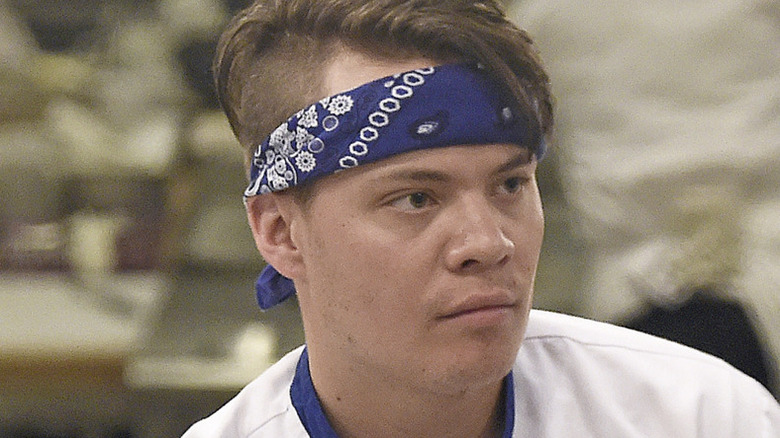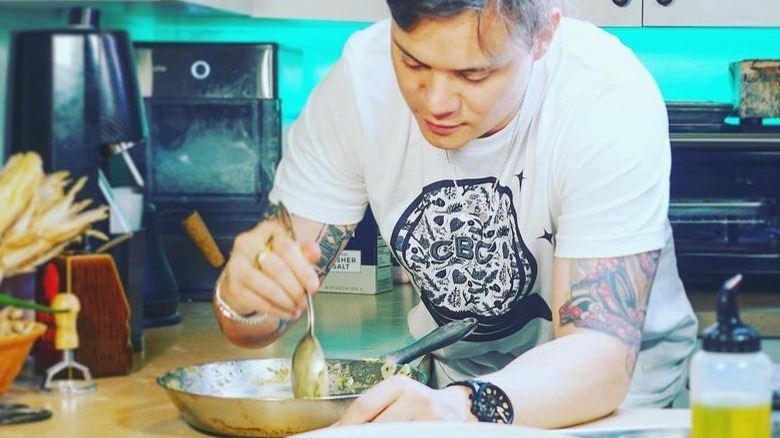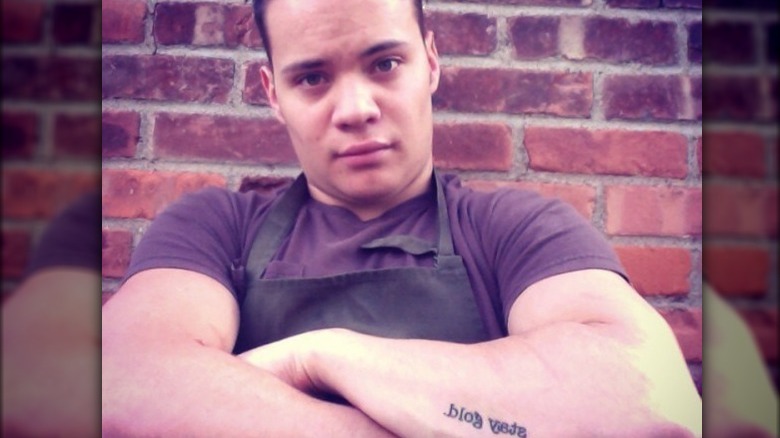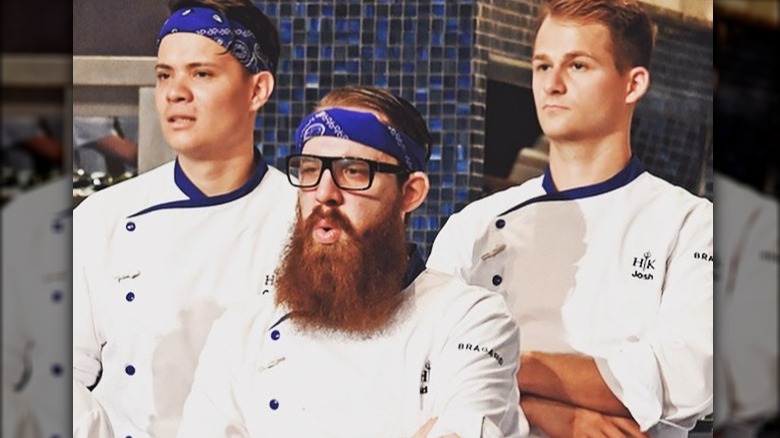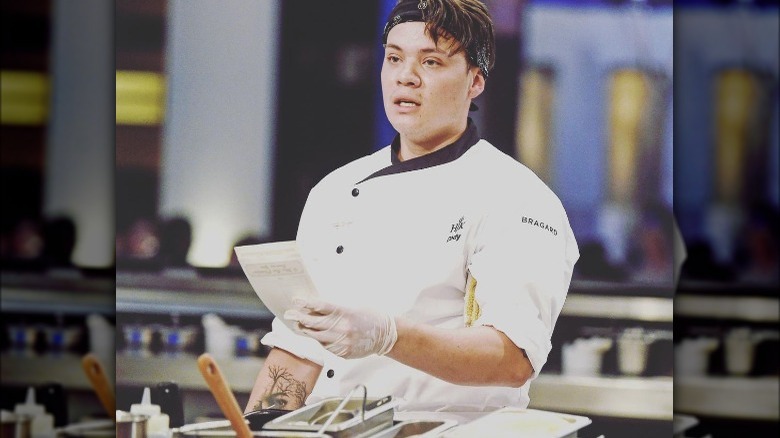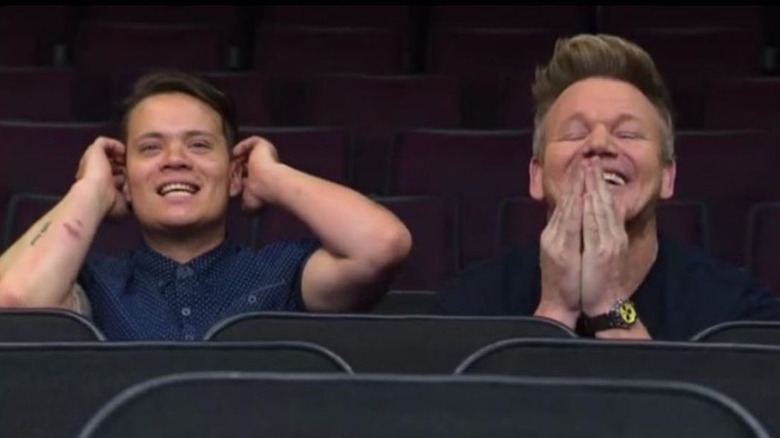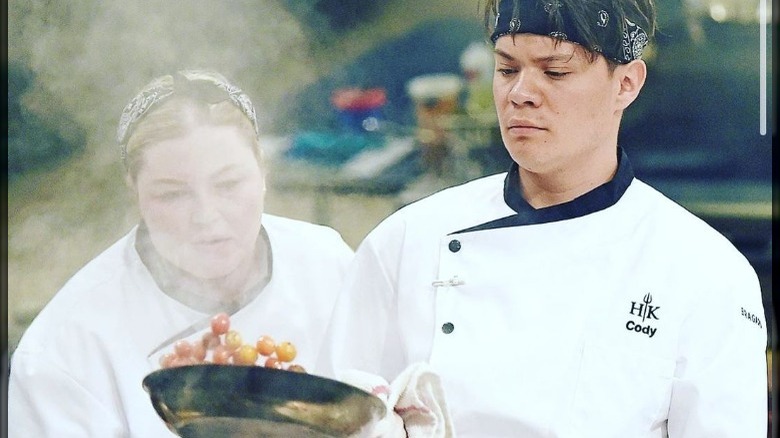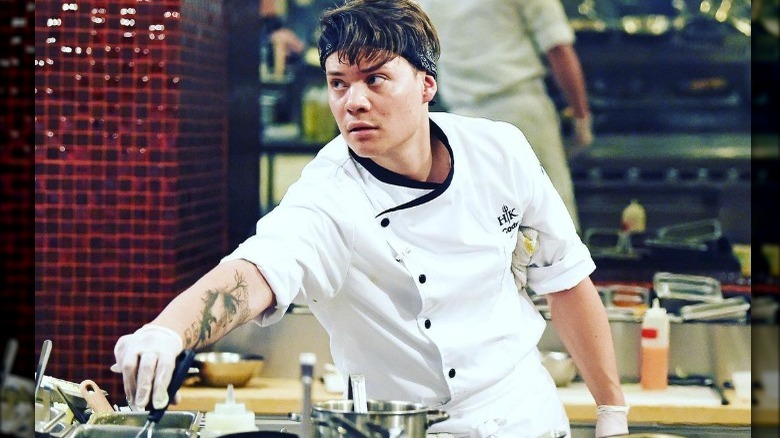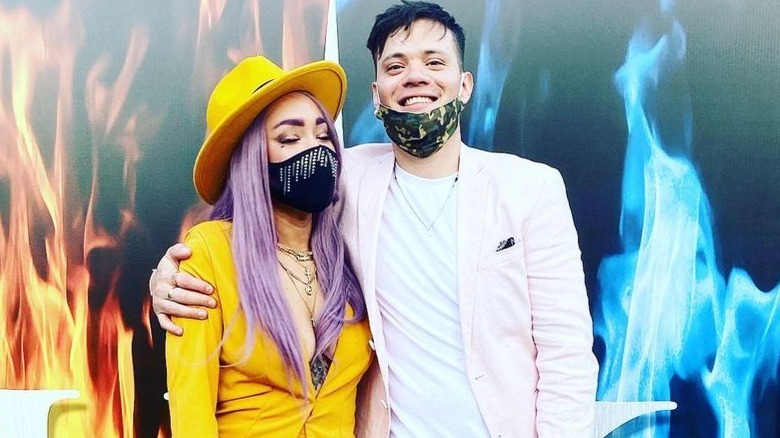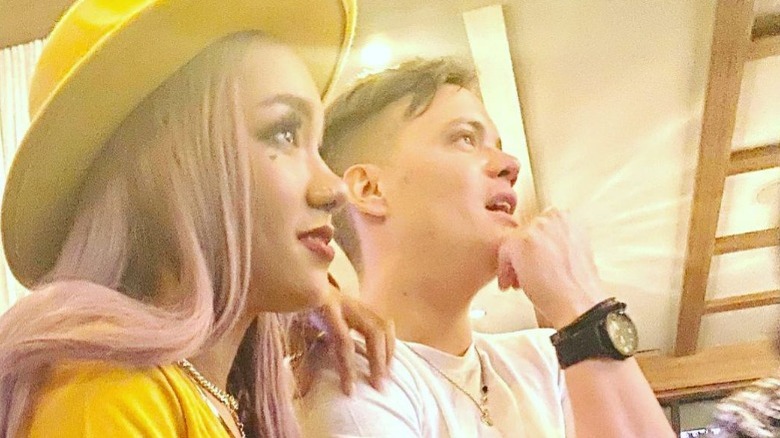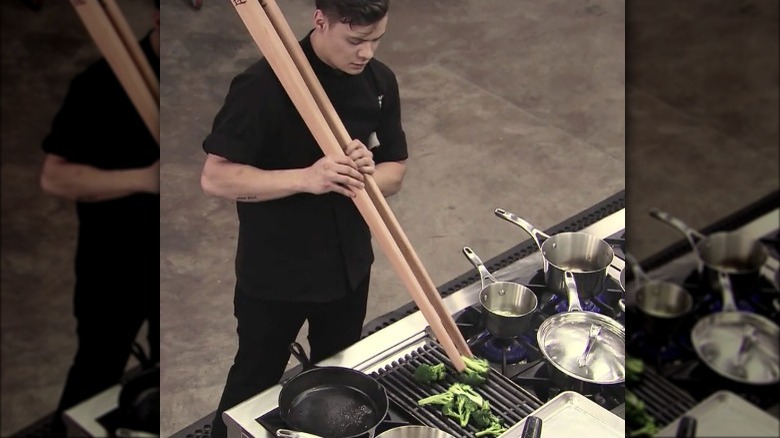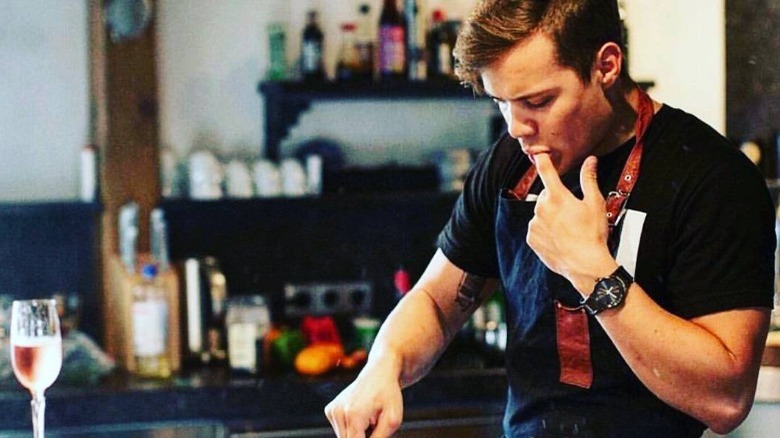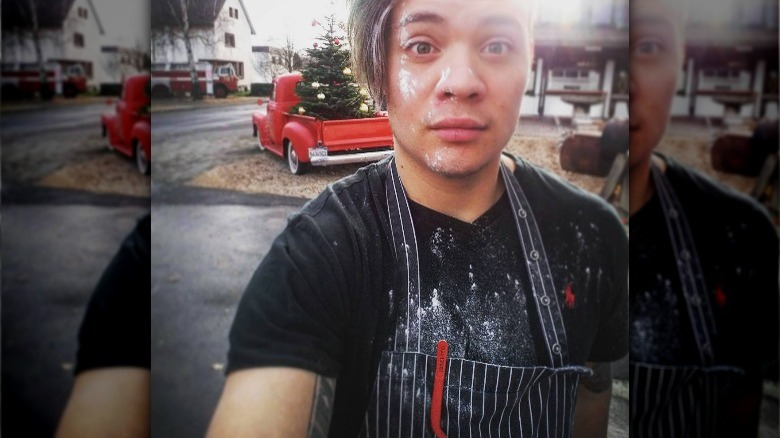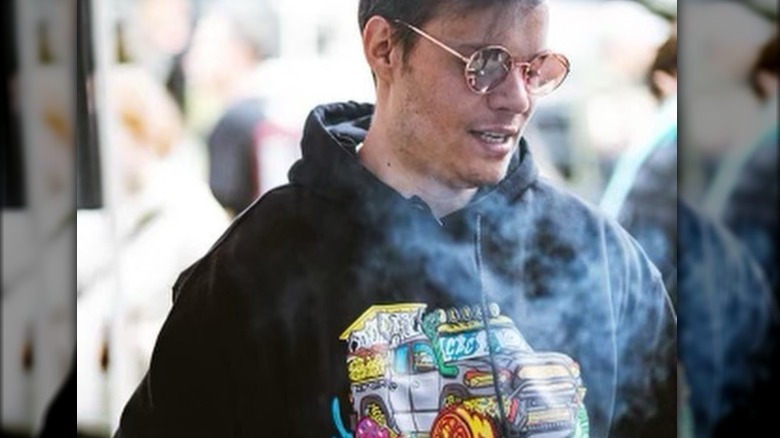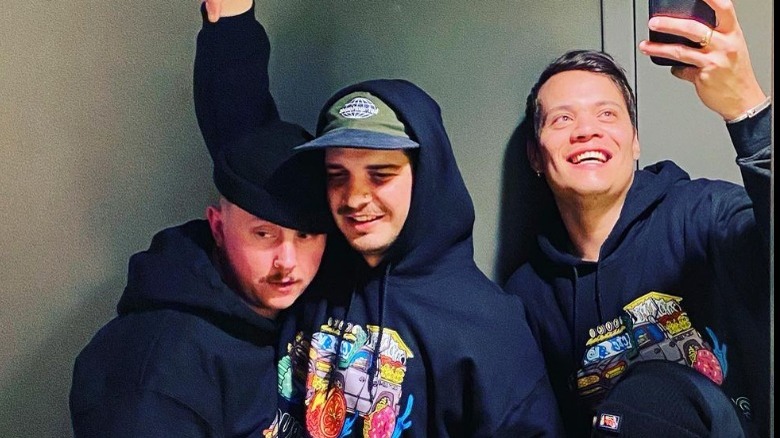Cody Candelario Talks Mental Health, Gordon Ramsay, And His New Shows - Exclusive Interview
Cody Candelario identifies as a competitor, in case that wasn't abundantly clear after watching him rise through the ranks on "Hell's Kitchen." "I think it's a different muscle," he told Mashed. High-pressure moments — times when you might see other chefs on cooking competitions storm off-set with smoke coming out of their ears — are what make Candelario tick. As the Season 19 competitor puts it, "My vibrational frequency does really well when it's in the center of the storm."
The chef made it to Episode 14 of 16 before mishaps attempting Gordon Ramsay's all-time-favorite Beef Wellington got him eliminated. He did so without a sense of smell, which is a testament to exactly how much Candelario can achieve when he has his heart set on it. Now, he says he literally can't wait to do something as intense as "Hell's Kitchen" and its notoriously difficult 20-hour-days again. No doubt he'll get his wish. Until then, the chef has a few surprises up his sleeves. In this exclusive interview, Candelario discusses those surprises, explores his "Hell's Kitchen" journey, and dishes on talking Rugby with Ramsay.
The pantry ingredient Cody Candelario thinks you should make
What is one ingredient you cannot live without?
Salt is a terrible answer. Salt's a super terrible answer, but you absolutely couldn't. I have it tattooed on my arm right here, from when I was really, really young, but that's a super caveat ... One thing I'm obsessed with right now is FGH, fermented garlic honey. I think it's the easiest pantry ingredient that only takes two things. [It's] a fun, easy science at home that can take anything from pasta dishes to desserts, to pizza, to anything, to another level — wings, vegetable dishes, [etc.].
It's garlic and honey. Honey, because there's so much natural yeast in the air, it exists for so long with air contact that it's so chock-full of natural yeast. Garlic has this [thing] in it — when you crush, it has these two things that mix together that creates this chemical called allicin, [which] is like a fermentation homey, [fermentation's] best friend. Those two things together, left at room temperature for two or three days, will tear honey from its slow viscosity to a really loose texture ... It leans into the more acidic [side of things]. [The result is] almost if you've made like a more flavorful honey simple syrup that has some garlic to it. That's one of my favorite things, for sure.
Who's one chef that you would like to have cook for you?
Probably Björn Frantzén. He owns Frantzén and a few other restaurants ... You should check out his Instagram ... what an animal. If I never had Andy Doubrava's food from Rustic Canyon, then I would choose Björn Frantzén. Björn Frantzén has an insane mind — the way that he comes up with his combinations and creations and makes them in such small formats. In terms of culinary [ideas], he communicates effectively. He's one of the people that communicates so effectively when he makes food and it blows my mind every time.
Cody Candelario has a thing for Mickey D's
We're going to continue with a cheesy question, which is what's your favorite fast-food order, and from which restaurant?
Easy. It's weird because I love — there are certain things that fast food can companies do that I find fascinating. There's a lot to be learned by anybody who can standardize something, too ... so without further ado, it's probably the McDonald's Double Cheeseburger.
Why?
They do a few things that are really intelligent in terms of burger design. It seems like their onions that they put on their burger are almost free from moisture. They're not dehydrated — and they're not salted or anything like that — but they are dried off ... to the point where they're basically texture. Their pickles are dried off too, which I find really smart. You're not adding any excess moisture, which you want to limit as much as you can, because, a beef patty is going to sweat like crazy. [You want] to keep that bun from going soggy, whether you're using potato starch, or otherwise, it's not ideal. To limit moisture any way — long story short — the dry pickles are super genius to me. In terms of the bite-depths, how [much effort] it is to take a bite [of the burger], I find [the Double Cheeseburger to be] a really perfect handheld [experience]. I'm a nerd. Welcome to the show.
What it's like to present your dish to a judge
Speaking of "the show," you've been doing some "Chopped" reviews on your Instagram. In one of your reviews, you noted how important it was not to anger a judge. Is that something you have personal experience with ...
Possibly! I wouldn't know, because it's hard to tell when I'm in front of them if they're actually mad or not. [That principle is] something I've learned in business and stuff like that. I've definitely had an earful from judges, whether it be Gordon and the many judges on "Hell's Kitchen," or in "Cutthroat [Kitchen]" or something along those lines. Honestly, that comes down to business and not burning bridges and being able to sell a product. I find that people ... as creatives, often we are really hard to deal with. It's really good to be able to create something, but you have to be able to package that and then distribute it and sell it at the end of the day. When it comes to dealing with judges ...
What's it like standing in front of a judge presenting your dish?
It depends on how the cooking process goes. I would say that normally, 90% of the time, I go up there with a plan. I've had enough time to digest what I'm doing and ... I know what I'm going to say. [I have it] in mind. It's more [like] getting on a roller coaster. I don't know how scary it's going to be, but I bought the ticket and I'm prepared to be scared, like that kind of stuff. I love it. My vibrational frequency does really well when it's in the center of the storm. I love stuff like that. When I'm in front of a judge or any kind of high-profile situation, I'm like, "Ooh!" — like that nervous feeling makes [me] feel comfortable.
Condy Candelario would do Hell's Kitchen again
You were a huge fan of "Hell's Kitchen" before you got cast. How did your expectations of what it was going to be like to be on the show meet up with what it was really like for you when you got there?
It was everything that I wanted it to be. I didn't put too much pressure [on myself in terms of imagining] what it could be. I had been a fan of the show, as you mentioned for the previous seasons, seeing all of them. When I went there, I was really excited to — I go into competition mode. My brain immediately is like, "All right, you're going to take everything that you've ever learned, and you're not going to worry about stuff that you aren't [in control of] and you're going to go in there, and you're going to use that [experience] and get honest feedback from people that you really care about."
Outside of putting the quarter in the machine, and seeing how it goes, [being on the show] was [akin to] the commercial that I had in my head — watching the movie — and the commercial meeting the expectation. It was so much fun. I felt invigorated. I love competitions, and that was the first time I got to do it for more than a single, individual day competition. It's one of the most vibrant [experiences I've had] and [most] alive I've ever felt. [I] can't wait to do something like that again.
Cody Candelario's favorite Gordon Ramsay story
Gordon Ramsay is a constant inspiration of yours. You got to go to dinner with him and ask him questions. What was that like? Can you give us your favorite Gordon Ramsay story from your time shooting with him?
What was it like? What's Gordon like? People always want to know, is he the same as he is on TV? I grew up watching him on "Boiling Point." People always think is that he's a novelty chef and it's mostly based on TV. He was almost the youngest chef to have three Michelin stars in the world. When I was younger, [he was a] huge inspiration. I [took queues from him], whether it was buying "White Heat," Marco Pierre White's book, [Gordon's] predecessor, or following his roadmap from when I was a young cook — [Gordon Ramsay was] super important.
Meeting him was way different. [As for] my favorite memory with him, it's really hard to choose, because [I] got to have a lot of really memorable experiences in all different categories, whether they're really hard to deal with and hearing something that was not necessarily easy, or something that's really fun.
The first day I met [Gordon], when we won day one, and we got to go out to dinner with him — going from telling me about dealing with the troubles that he went through with his brother and his family to asking him what kind of sports he plays. He says he got hurt playing soccer and [me] making a joke about like, "You ever think about playing like a real sport, like rugby?" and him laughing, stuff like that where it's — he's a really great person to be around.
How Cody Candelario cooks without a sense of smell
You went [to "Hell's Kitchen"] with a pretty big handicap. You had lost your sense of taste and smell. What was that like during the competition? More broadly, how has that affected your journey as a chef and your ability to enjoy food?
I'll try to break that into sections. What is it like in my journey as a chef? When it first happened ... [I] went through a really traumatic illness around five years ago where I got really sick and I lost my sense of smell. Never got it back. I was living in Germany at the time and it took me [about] 40 days to realize this is a problem. It was really, really hard at first. The first six months ... I wanted to give up my career, and then some. Fast forward a couple [of] years, I started to look at [losing my sense of smell] as a challenge and really [to] delve into what I've been doing with the rest of my career.
Instead of shooting for a job that I want[ed], [it was] more shooting for a challenge that's personal, trying to approach [losing my sense of smell] it that way. Now, I 3D-map differently. I think about food in different senses, and I try to design stuff from the ground up and really approach stuff from the sensory capabilities that I do have, which is most of the balance components: sweetness, acidity, salt, fat, umami, things of that nature ...That was how I approached it. Then, I developed a system of how I'm going to approach developing flavor and whether it's developing flavor and actually being able to continue to learn and be a chef and stuff like that, or fundamentally being useful in a kitchen. I think most of [the stumbling blocks I encountered at first] came down to insecurity.
It's a lot like being a musician, in the sense that if you became blind and you had been doing it for so long, you would still be able to perform, [but] it would make it much more difficult to learn. You might need more help. It's a good exercise for me because I am a very hard worker and I've constantly been the biggest dreamer in the world and everything can happen, but I'm terrible at asking for help. It was almost like a terrible crash course and, "Hey to do this well, you're going to need to ask for help." That's the first part of your question.
Cody Candelario's 'Hell's Kitchen' low
How did [not being able to smell] play out on "Hell's Kitchen" when you were competing?
Luckily, it happened then. If I was to get on "Hell's Kitchen" right when [I got sick], that might have been a different story, because of my headspace. At the point [I got on "Hell's Kitchen"], I'd developed systems. I'd taken a few years and developed a fun business. I'd been doing crazy amounts of events and private chef work and pop-ups and consulting [all] in a couple of years ... I was really confident, again. I went into "Hell's Kitchen" like, "All right, let's see how this goes." I would say that I was 99% successful. There was one point during the second "Taste It, Now Make It" challenge where it broke me for a second. I got really afraid, where I haven't felt afraid like that since I left home when I was like 16 years old. I felt childishly afraid.
What was going on in that moment?
I was probably hiding a bit from myself, thinking that I was much more far along with it than I was. I was faced with that fear that I had been hiding. I was sitting in a situation where, all right, this isn't just [some] individual [dish], that I'm going to try and try to take context clues from texture, [or from] acidic mobility and anything like that [that] I'm trying to teach myself. This is a composed dish with 15 different components. And I just panicked and I thought like, "This is how I'm going to go out." It was like, I want to say probably 30 minutes was the challenge and the whole time, it was probably the most scared I've been since I was a kid.
When we were getting judged, I had one of those moments where I was like, "This isn't going to take me out. No one's going to find out anything that's going to ruin my career or get me sent home." At most, I've been obfuscating. I haven't been lying about anything. I was like, "You're going to get a basket challenge next and you're going to do what you do every time and f***ng win," and then I did. They gave me a basket challenge for the next round, and it wasn't as scary as I thought it was. All I had to do was believe in myself. They gave me a basket challenge and [Gordon Ramsay] said it was the best dish that he had through the entire competition.
How friendships form on Hell's Kitchen
Talk about the friendships you make while filming this show. There were a lot of rumors going around about you and Mary Lou [Davis].
Who?!
This kind of show must generate some intense bonds between contestants. Could you speak to that?
Competitions, amongst many high-stress point activities in life, are a point where you ... it's the place where you have the least amount of avenues to run from. I find that people end up being able to see people, in aspects of who they are that don't normally get captured in normal life. That's my theory ... in really short terms, of why it's so easy to develop really crazy relationships in those settings.
Especially in a setting like "Hell's Kitchen," it's really difficult. A couple of people quit. One person went to the hospital and the 18 people that we competed with ... every day when you're being pushed constantly — not just moment to moment, but literally being asked the most of yourself all day long, physically, mentally, spiritually, whichever — for 20 hours, every single day until you go home, it's crazy. It's really tough. When you find people that you can gravitate to and find humanity in, it's a godsend. It's like finding a hotel.
Cody Candelario takes us off-camera on 'Hell's Kitchen'
What's your favorite off-camera moment from ["Hell's Kitchen"]?
I had many. I developed a great relationship with Mary Lou on the show. When we first started to talk, I loved the fact that she and I [could] play cards together. It was something where, although we would play speed and it was a competitive game, it was something where it was docile and not requiring of anything. It was more like comedic release and decompression. It was so much fun. Declan [Horgan] and I were from — pretty early on, developed an amazing relationship in the sense that we'd [talk] at night, to each other sometimes, because we had a feeling that we'd be there for a while.
There's little senses of camaraderie ... I identify as a competitor. It's a different muscle. If anybody's familiar, [it's] like being a rapper as opposed to being a battle rapper, they're two completely different skills. I really vibe with people who understand that conceptually. You start to see the people after a while, you start to separate from, "I'm a chef and I'm going to win this chef competition," as opposed to treating it like a real competition, [and] understanding that you're going to have to break bread with these people at the end of the day, and [understanding] that our careers will much longer last [than] this show ... For example, like Kori [Sutton], Mama Kori on the other team, she'd always be rolling up people's sleeves and making sure people looked right and stuff like that ... I started to see the people that were going to be there for a second. We started to vibe.
What Cody Candelario's up to now
How has getting so far on "Hell's Kitchen" affected what you're doing right now? Your social media following shot up during the show. What's this been like for you?
That's been interesting. Right before the show came out, I had been consulting on a dream project. I was working on a resort concept in Aspen, one of the biggest developments there. We were starting to do write-ups in Forbes, in the Wall Street Journal, in The New York Times and starting to get a lot of big eyes. I hired a team. I designed a kitchen that was built and we created all sorts of standards and practices ... I really ironed out this project, and then COVID hit. It was a year — after the amount of time we put into developing it — it was a year of struggle and trying to get it up. Eventually, the investors ... and the rest of the team came to the consensus.
[We thought], "We don't know if we're going to open," so we had to vault that idea. It never came to light. That was a month before the show was going to come out, and I was sad. I was like, "My little restaurant baby is not going to [happen]." [Then] I was like, "All right, I'm going to have all this momentum." I was thinking of it like wind and sails and that kind of situation, that metaphorical situation. I was like, "All right, everything that I had in terms of momentum with the resort, my sales [being] able to pick up that wind are no longer there. What can I make the most of in terms of all of the amount of eyeballs, they're going to try to find me and search me, [etc.]?"
I gravitated toward social media. I was like, "I see that this is a relevant business, and this is where business structure is kind of evolving to." I enjoy education and information [giving] and making ... the right kinds of TV shows and stuff like that ... I took a day and I cried like crazy, because when I was like, "My baby." Then, the next day I was like, "All right, maybe a media company."
That's when I was like, "I want to put the root systems into that." That's what the show has done for me ... I knew there was going to be a lot of people that wanted to know who I was or to follow more about me or to see like, "That dude is funny," or "I hate that guy," or whatever. To create a business around that, to create a set of sails and a place to ... use that wind source to push me in a forward momentum that wasn't a business that I was working in prior [is] what I've been doing with social media.
Cody Candelario's mental health check-ins
You spend a lot of time on social media talking about mental wellness actually, which is really refreshing. What brought that on?
It's been hard. I love doing it. It's really important to me. I recently had to take a break from it because I wasn't in a good space mentally myself and it got hard ... I speak about that openly. It's not like I didn't want to only do it when I felt strong, but it got to a point where ... I didn't feel that helpful. I need to focus on myself again, but mental health is crazy important to me. I grew up with my earliest memories, when I was younger, were panic attacks, [and] this irrational fear of throwing up, because I always thought I was sick when I was a kid. I'd wake up with this weight of the world, as if I had done everything wrong every day, like the police were going to come for me and I was going to get locked [up].
I couldn't figure out why. I was like, "Why am I always in trouble in my head?" [My anxiety] got to feed on [the] industry that I ended up going into, chef-ing ... A term I always try to use is people are wearing their helmets more now, meaning, when I was a kid and skating and stuff like that, it wasn't cool to wear your helmet. In kitchens, when I started, [it] wasn't cool to say when you weren't well, when you weren't feeling well. [There are] a bunch of masculine or terrible traits that were associated with that. There's a bunch of stuff that I didn't find healthy.
Cody Candelario talks mental health in the food industry
How have you seen mental health in the industry evolve?
People are wearing their helmet more, meaning that we talk about mental health more. The industries [are] becoming more safe, and stuff like that, but the issues that I had with anxiety and depression, [etc.] — when I was younger, [I] got a foster home in the industry that I thought was making me stronger, because everyone says that strength is only about being strong. I have learned over the years that strength also involves [not only] being strong, but understanding weakness ... now, I don't see certain things as weakness. It's introduced this new polarity that I find so fun.
The mental health check-ins for me are amazing. I look forward to doing them more. I don't know if, during that process, what I learned is I want to be involved in them, or [if] I want to facilitate them. What I'm trying to do right now, too, is get someone who I found is an absolute animal and stuff like that, really willing to do the emotional homework of going there with people. I want to pair him with someone who I also think is already building a platform in that nature and be the mediator, because it's amazing.
I love being kind and refurbishing people's opinions on what relationships are. [It's] easy homework. I always tell people, especially when I'm doing some random act of kindness where someone is perplexed — "Why are you doing this?" I'm like, "Hey, it's my mindset. We're all in the same team." It's really good to meet your teammates. It's what I was trying to tell people. ... I hope that offers some sort of perspective.
Cody Candelario has a history with food trucks
Now, one of the other projects you may be working on is [the logo] on your shirt.
Yeah. You are very well researched. I love this.
When you got to Germany, you worked in your first food truck, right? A burger joint truck, and now you're back to this. Tell us what it is.
My first job in a food truck, actually, was when I was 13. It was my first culinary job ever. But ... the first food truck I ever opened was in Germany. But you're yeah ... This is a great interview. You're really good at that. Yeah ... I guess my life has always involved food trucks.
My mom's first big business when she came out here was called Studio Airstream. She opened up her first business for marketing and things of that nature. In an Airstream trailer, my first job when I was 13, was working in a food truck at a farmer's market ... The first food truck that I ever opened in Germany was an Airstream trailer., and it's continued. This new concept of the food truck is a little bit different. I've been looking for new ideas, and this is one that I've always wanted to do ... As I've been shifting towards developing a media company, I've been looking for new fun culinary avenues. I love cooking, and I love bringing that form of education and fun and my way and what I think, [bringing] a really honest depiction to the public. Where can I start to put that energy into?
Cody Candelario's upcoming show
Where did you put it into?
When I lived in Colorado, before the resort closed down, I bought a brand new truck. I bought a Toyota Tacoma, 2021, a brand new car with 30 miles on it because the resort was about to open. I was like, "Yay!" And then we closed. And I was like ... "Okay, I just bought a truck. I don't want to give it back because I love it. Where can I combine these two [situations]?" I started to look at what the landscape is for that kind of stuff. It's like all real dads. I saw an opening where there isn't a real chef presence. I partnered with this really amazing company called Lolo Overland. They are an amazing outfitter based in Portland, Oregon.
They take vehicles and make them really tough and beefy and make sure that they can go places and set them up with the right technology and equipment to the point where they can travel anywhere, camp anywhere, and do anything. They are going to outfit my vehicle to be the most — for lack of a better term — badass off-road vehicle, while at the same time, trying to make it a mobile source of cooking that I can pull up anywhere and do anything. We have a really fun roadmap where this is going to be shot for social media and YouTube. We have a litany of fun partners that we're working with to make this happen, and then outside of that, it's also going to be a mobile pop-up.
I'm working on a few concepts right now. I ironed out the pizza portion of it. It's a very from-scratch pizza program that's done with — Actually, I can't name them because they're not a partner yet — but yeah, I have a pizza pop-up. The next one that I'm working on is a Smashburger pop-up. The next one after that is a handmade pasta pop-up. Basically, it's going to be like a mobile food court. Between the mobile food court that I'm establishing in this brand, there's a bunch of fun root systems that I'm doing with it.
Long story short, it's going to be a show called "Thee Food Truck" that's made for social media. It's going to have a really fun roadmap where people can tap in about pop-ups, events, and the resulting treasure hunt that my collaborator hosts, that goes country-wide every single year, two times a year. Whether it's interest in food and fun events or interest in camping and outdoors or interest in automotives and off-road and things of that nature — this show has a really, really fun aspect, but we're trying to bring a real effective, culinary component to adventure and outdoors and events. It's one of the projects that I'm working on.
Cody and @lolo_overland are currently hard at work on their newest show, @theefoodtruck. Follow all of their Instagram profiles for updates on this and other upcoming projects.
